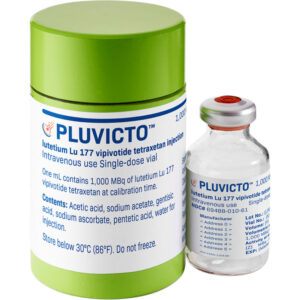April 2022: The Food and Drug Administration approved Pluvicto (lutetium Lu 177 vipivotide tetraxetan, Advanced Accelerator Applications USA, Inc., a Novartis company) for the treatment of adult patients with prostate-specific membrane antigen (PSMA)-positive metastatic castration-resistant prostate cancer (mCRPC) who have been treated with androgen receptor (AR) pathway inhibition and taxane-based chemotherapy.

On the same day, the FDA approved Locametz (gallium Ga 68 gozetotide), a radioactive diagnostic agent for positron emission tomography (PET) of PSMA-positive lesions, including selection of patients with metastatic prostate cancer for whom lutetium Lu 177 vipivotide tetraxetan PSMA-directed therapy is indicated. Locametz is the first radioactive diagnostic agent approved for patient selection in the use of a radioligand therapeutic agent.
Patients with previously treated mCRPC should be selected for treatment with Pluvicto using Locametz or another approved PSMA-11 imaging agent based on PSMA expression in tumors. PSMA-positive mCRPC was defined as having at least one tumor lesion with gallium Ga 68 gozetotide uptake greater than normal liver. Patients were excluded from enrollment if any lesions exceeding certain size criteria in the short axis had uptake less than or equal to uptake in normal liver.
Efficacy was evaluated in VISION (NCT03511664), a randomized (2:1), multicenter, open-label trial that evaluated Pluvicto plus best standard of care (BSoC) (n=551) or BSoC alone (n=280) in men with progressive, PSMA-positive mCRPC. All patients received a GnRH analog or had prior bilateral orchiectomy. Patients were required to have received at least one AR pathway inhibitor, and 1 or 2 prior taxane-based chemotherapy regimens. Patients received Pluvicto 7.4 GBq (200 mCi) every 6 weeks for up to a total of 6 doses plus BSoC or BSoC alone.
The trial demonstrated a statistically significant improvement in the primary endpoints of overall survival (OS) and radiographic progression-free survival (rPFS). Hazard ratio (HR) for OS was 0.62 (95% CI: 0.52, 0.74; p<0.001) for the comparison of Pluvicto plus BSoC versus BSoC. Median OS was 15.3 months (95% CI: 14.2, 16.9) in the Pluvicto plus BSoC arm and 11.3 months (95% CI: 9.8, 13.5) in the BSoC arm, respectively. Interpretation of the magnitude of the rPFS effect was limited due to a high degree of censoring from early drop out in the control arm.
The most common adverse reactions (≥20%) occurring at a higher incidence in patients receiving Pluvicto were fatigue, dry mouth, nausea, anemia, decreased appetite, and constipation. The most common laboratory abnormalities that worsened from baseline in ≥30% of patients receiving Pluvicto were decreased lymphocytes, decreased hemoglobin, decreased leukocytes, decreased platelets, decreased calcium, and decreased sodium. Treatment with Pluvicto may result in risk from radiation exposure, myelosuppression, and renal toxicity. The safety follow-up duration in VISION was not sufficient to capture late radiation-associated toxicities.
The recommended Pluvicto dose is 7.4 GBq (200 mCi) intravenously every 6 weeks for up to 6 doses, or until disease progression or unacceptable toxicity.
View full prescribing information for Pluvicto. View full prescribing information for Locametz.

